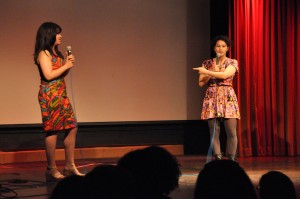what makes Broad City so radical?
Comedy Central’s new female-based comedy, Broad City, created by and starring newcomers Ilana Glazer and Abbi Jacobson, has been one of the most pleasantly surprising, bizarre, stoned-out-of-its-mind and profoundly funny shows TV has had to offer. Some of that can be attributed to its beginnings as a web series before making the leap to primetime, which helped the show start off on a confident, established note. But it’s because of the truly radical depictions of women it offers that makes the show as great as it is.
It took me a few episodes to fully appreciate how original and transgressive the series really is. With its setting and census demographic, comparisons to HBO’s Girls is unavoidable. Both show a group of females steering the mid-20s grind through the streets of New York City. However, similarities end there. Lena Dunham’s series examines typical characters telling a relatively overworked story of what its like to be young and struggling in the big city. Ultimately, the insecurities that the main characters endure spill over to poison and dishevel all their friendships and romantic relationships. Broad City on the other hand offers something that is long overdue on television: a portrait of friendship between women where they don’t undermine each other, fret over how they look or define themselves by whom they’re sleeping with.
Main characters Ilana (Ilana Glazer) and Abbi (Abbi Jacobson) are superbly and carefully crafted. Ilana is a high energy, under-achieving 20-something New Yorker who, in theory, might sound like an “unlikable” character. She pretty much does exactly what she pleases without any concern to anyone else around her. She leaves work in the middle of the day to take another job or have a long nap in her office restrooms. She Skypes during sex and dances to 90s hip hop wearing a tuxedo in the back of a moving van. She’s totally incompetent and irresponsible yet she still manages to leverage her relationships well and hold down an acceptable job. Sound familiar? This ability to have no abilities at all and still survive in the world is what a lot of white male privilege looks like. We’re finally able to see a representation of a woman who uses her confidence to do whatever she wants so much that you end up admiring her – and that is what makes her character so radical.
Ilana’s more reserved best friend Abbi is the responsible one – she works at fancy gym, Soulstice, in hopes she might one day become a trainer and rid herself of her towel-washing and toilet-cleaning profession. Abbi is literally the kind woman who attaches post it notes to her vibrator to remind herself to masturbate. Still, she has spells of benevolent derangement and self-assertion just like Ilana.
Ilana and Abbi are two genuine, broke NYC girls who hate their jobs and spend most of their time smoking weed – they’re literally female stoners, and they’re hilarious. There’s nothing more unoriginal than the male 20-something stoner, but when you transfer those character traits onto a female it automatically does something transgressive, pushing the stereotypical boundaries of “proper femininity.” Women like Ilana and Abbi definitely exist in the real world, but no one ever sees them on the screen. They’re seen as ‘bad examples” of women because audiences are so unaccustomed to watching a woman be so shockingly comfortable and self-assured and not look like a supermodel. It’s essential for both men and women to see that women can be assholes, too.
Desperately scraping their rent and weed money one dollar at a time, Ilana and Abbi make a lot of bad decisions and always get into haphazard mischief. They rarely make the right call. But they have a committed best-friendship that is a continuous source of delight and support. It’s a relationship that triumphs crappy jobs and unscrupulous roommate situations and permits both women to be exactly who they are. They as characters are defined less by their individual quirks and more by their hilarious devotion towards each other. As a duo, they reject the exacting standards that most women feel they have to live up to and they feel great about themselves. Because of this their relationship is a female friendship we can relate to and is the clear anchor of the series.
Broad City enables Jacobson and Glazer to create a little corner of the comedy universe where women are presumed to be hilarious screw ups in roughly the same ways, and based on the same principles, that men have been in the past. Broad City couldn’t care less about feminist semantics and debating feminism credentials – it offers a different and unique kind of feminism expression that doesn’t require it to be screamed from the rooftops. It doesn’t dwell on male or female behaviours and poses no big questions about female desire or sexual conduct. It’s a kind of every day feminism that feels sincere and necessary.



This piece is great and really makes me want to watch the show! I love how you describe ‘Girls’ – those are my sentiments exactly.